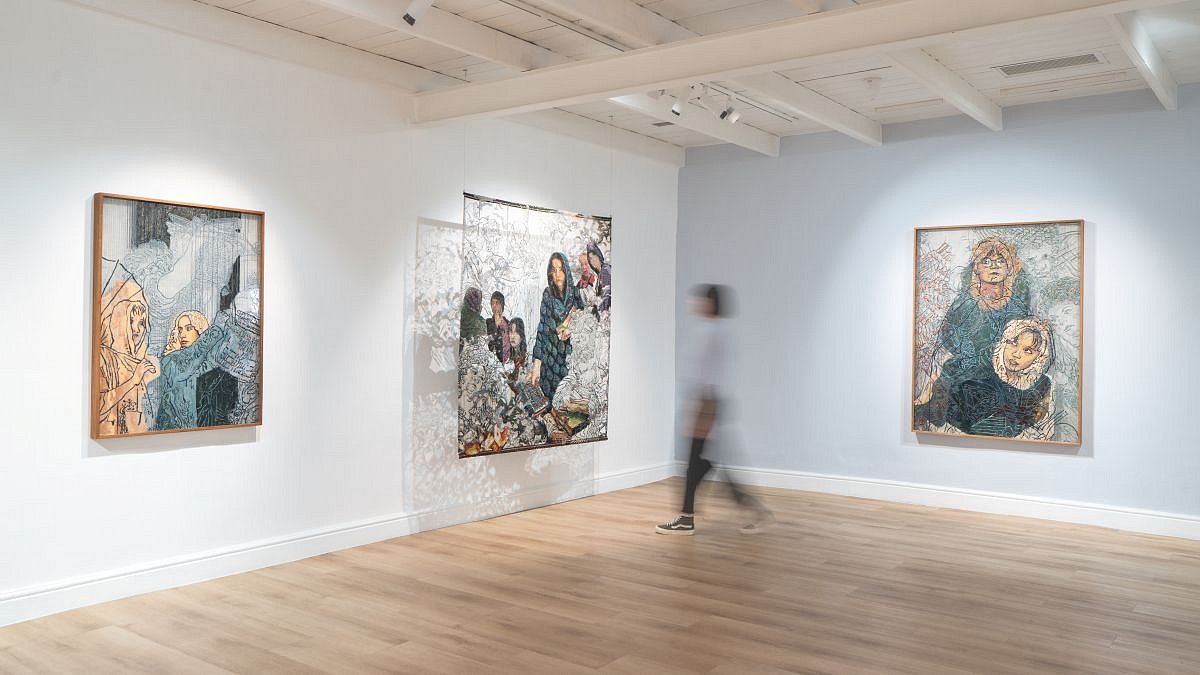PRESS RELEASE

TAMLIN BLAKE | Treading Lightly
Oct 19 – Nov 9, 2025
TAMLIN BLAKE
Treading Lightly
20 Huguenot Road
Tamlin Blake’s exhibition Treading Lightly examines the fragility of memory, censorship and the responsibility of inheritance. The works stand in direct dialogue with the 16th-century tapestry Burning of the Pagan Books, commissioned by King Henry VIII, while also drawing deeply on Blake’s own family history and the precariousness of cultural heritage.
The Renaissance tapestry is the sole surviving work in a series of nine tapestries illustrating the life of Saint Paul and depicting the burning 'heathen' books at Ephesus. Here books tumble into fire, are trampled or discarded as symbols of “dangerous knowledge.” Their destruction is celebrated as righteous triumph, an act of censorship that reinforced church and crown authority by dictating which stories and ideas survived. In her reworking Blake inverts this meaning - books are no longer dangerous objects to be eradicated but fragile vessels of memory and identity.
“The old tapestry captivated me for its beauty, subtly and exquisite craftmanship. However, I was also entranced by the notion of burning books and that unbelievably this is still done today, both literally and figuratively through social media. I am deeply concerned with how social media so easily endorses censorship and that there is always the threat of being silenced or ostracised.” – Tamlin Blake, 2025
Blake’s interest in memory and erasure is not only historical but also profoundly personal. Her great-grandfather’s diaries from the Anglo-Boer War were once treasured family heirlooms, only for them later to be rewritten by his wife who inserted herself into his narrative. As dementia overtook her, her rewritten copies became increasingly illegible and eventually destroyed the originals. This act, part preservation and part erasure, raises unsettling questions about authorship, memory and power. Who has the right to shape a story? Whose voice is lost when another takes control? And how does rewriting affect the collective memory of a family or of a culture?
The impermanence of memory and cultural heritage was underscored yet again in 2020, when a fire in Franschhoek destroyed a private collection of South African art. On how this event personally affected her, Blake says:
“The fire decimated a large portion of the house including the art collection with which I had had the privilege of working. Many of the destroyed artworks were by artist friends of mine or artists I deeply admire. All that was left on the walls were the metal hanging fixtures and stains on the walls where the oil paint had melted down to the floor.”
Like the burning of books in the 16th-century tapestry this blaze was a stark reminder of the vulnerability of cultural objects and the ease with which heritage can be lost.
Blake often uses her own children and their peers as models, grounding conceptual concepts in the intimacy of her own life. The often complex layering of contemporary figures and the line work of figures from the 16th Century tapestry suggests the ghosts of the past persisting into the present, always informing and sometimes overshadowing who we are. The works thus ask: who inherits which stories? Who tells them? What is preserved, rewritten, or erased? Identity emerges not as static but as an evolving negotiation between what the next generation chooses to hold, mourn, or let go.
At its core, Treading Lightly critiques censorship in all its forms whether through fire, rewriting, or omission. Censorship does not bring clarity; it leaves voids. Blake’s new body of work reminds us that to tread lightly is not to move timidly but with awareness: to acknowledge that each act of remembering or forgetting carries weight. Blake’s chosen mediums, either labour-intensive hand-woven tapestry or textured paintings, echo her love of textiles and become in themselves a metaphor for care, deliberate and attentive. By literally weaving together the historic burning of books, the loss of her family’s diaries, and the devastation of the Franschhoek fire, Blake creates a layered cautionary tale about fragility, inheritance, and responsibility.
EVERARD READ FRANSCHHOEK - 20 Huguenot Road
Franschhoek, 7690
South Africa
+27 21 876 2446 l fgallery@everard.co.za
Operating hours:
Monday – Sunday 09:30 - 17:00
Please contact fgallery@everard.co.za to make a booking outside of these hours



